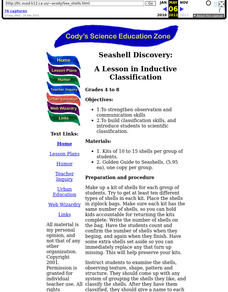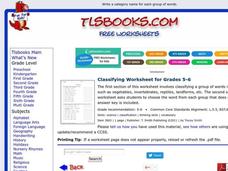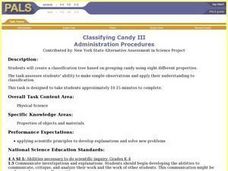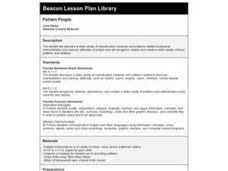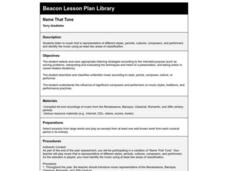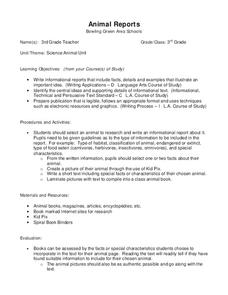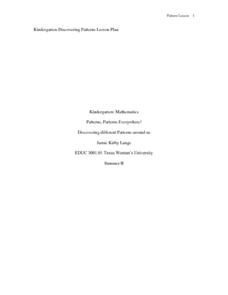Curated OER
"Zoophyla"
Ninth graders gain an understanding of organims based on charateristics. They study about Kingdom Animalia and use technology to present knowledge of phyla. Finally, they create a new animal species of their own. When others present,...
Curated OER
Are You One of Us?
Young scholars investigate how scientists sort and classify organisms. In this sorting and classifying lesson, students examine what systematics are as tools that scientists use. They examine images of invertebrates and sort them while...
Curated OER
"Publication" of Scientific Papers And Posters
Students create and display a scientific poster in the same format that scientists use at a research symposium. They compile data and make conclusions about the classification of the Arizona Hedgehog Cactus as an endangered species. ...
Curated OER
Seashell Discovery: A Lesson in Inductive Classification
Students examine the shells, observing texture, shape, pattern and structure. They should come up with any system of grouping the shells they like, and classify the shells.
Curated OER
Classifying
In this classifying activity, students observe a group of words, analyze their similar characteristics and then give them a classification. Groups of words include items such as vegetables, reptiles, landforms, conifer trees,...
Curated OER
Classification and Attributes
Middle schoolers classify objects based on their attributes. They explain how archaeologists use classification to help answer research questions.
Curated OER
A Fiedl Study of an Integral Species
Pupils compile baseline population information on a local species. They design and conduct a scientific investigation of a local species. Students interpret, analyze and communicate results based on sound scientific and mathematical...
Curated OER
Five Kingdoms of Living Things
Fifth graders are introduced to the classification system used in Science. In groups, they explain the characteristics of each of the five kingdoms. After watching a video, they review the life processes of each kingdom and complete a...
Curated OER
Species Interactions
Students study the scientific concepts of biodiversity and conservation through the use of basic equations of population growth and hands-on experiments/simulations. The lesson includes a take-home assignment which can be used for final...
Curated OER
What Kind of Insect is That?
Fifth graders characterize insects and classify insects according to the Linnaean system. They use hand lenses or microscopes to examine insect body parts.
Curated OER
Classifying Candy III
Students create a classification tree based on grouping candy with eight different properties. This allows students to understand how living things are classified.
Curated OER
Pattern People
Students describe a wide variety of classification schemes and patterns related to physical characteristics and sensory attributes of people. They recognize, extend and create a wide variety of those patterns and relations.
Curated OER
Name That Tune
Fourth graders listen to different types of music, then categorize them into two different areas of classification.
Curated OER
Survival
Pupils identify characteristics of Australia, Africa and Antarctica and compare and contrast them to each other. They work together to identify adaptations that animals have used to survive. They also practice classifying animals.
Curated OER
What's In A Name?
Students create a binomial system of nomenclature for classifying organisms they encounter in a field trip to a natural history museum or from pictures in library books. They work in small groups to create accurate drawings and place...
Curated OER
Animal Reports
Third graders choose an animal to research and write a report about. They determine the animals' habitat, animal classification, whether it is endangered or extinct, and the type of food it eats. Also, they add any special...
Curated OER
Alien Invaders: Native vs. Exotic Species
Seventh graders investigate the differences between native and non-native species. They answer different level questions using Bloom's Taxonomy. This is done creatively with the students playing a version of the game Jeopardy. Students...
Curated OER
Sorting Things Out
Written to examine seeds that grow in Kansas, you can adapt this lesson to anywhere you live. Learners sort a mixture of five different seeds to by any characteristic of their choice. When your budding scientists are exploring the life...
Curated OER
Rule It Out
Here's a way to create math fact flash cards! Learners create their own cards and sort them into matching categories. Students start with addition and work their way up to harder math such as multiplication, and are asked to notice...
Curated OER
Sorting Sets
Here is a simple sorting activity which is appropriate for pre-k and kindergarten learners. Pupils sort each of four items into the correct group, then count the totals and write the numbers in the boxes provided. Along with being a good...
Novelinks
Zach’s Lie: Questioning Strategy – Cubing
Your class won't be a bunch of squares from using this well-rounded activity! Instead, they'll be expressing thoughtful questions using the cubing strategy. The class brainstorms questions of increasing rigor about Zach's Lie in the...
Science Friday
Microorganisms on the Move
You can't b. cereus until you see this lesson! Young microbiologists learn to prepare deep well slides, observe two types of microorganisms, and compare and contrast their physical characteristics in this interactive and lively activity.
Smarter Balanced
Classifying Vertebrates
What features do scientists use to classify animals into groups? Class groups examine a series of paired images of vertebrates (a bass and a trout, a toad and a newt, a crocodile and a tortoise, an owl and a robin, a tiger and a bear)...
Texas Woman’s University
Patterns, Patterns Everywhere!
Not only is pattern recognition an essential skill for young children to develop, it's also a lot of fun to teach! Over the course of this lesson, class members participate in shared readings, perform small group...





